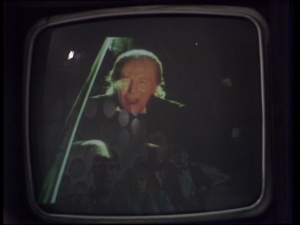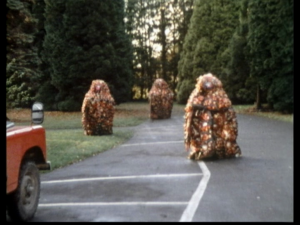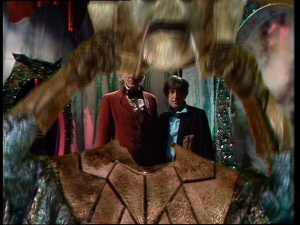Doctor Who: Fifty Stories For Fifty Years: 1973
April 10th, 2012
Steven Moffat once said of Doctor Who that it “was a great idea that happened to the wrong people”. Some might think that this says more about Moffat than about Who (in my experience writers who think of ideas as ‘happening’ to other writers, rather than being produced by those other writers, tend not to have very many ideas of their own) but in some cases one can see what he means. The Three Doctors, and in general all the work of writers Bob Baker and Dave Martin, tends to be a case in point.
Baker and Martin are not bad writers — very far from it. Bob Baker is the only writer on Doctor Who ever to have won an Oscar for scriptwriting (for the Wallace And Gromit animated films, which he co-wrote), and Baker and Martin also created K-9, almost certainly the best-known character in Doctor Who outside the Doctor himself.
But the fact remains that nearly all of their stories for the series are considered fairly poor efforts by most Doctor Who fans, and it’s easy to see why. The Three Doctors, for example, for all that it has a place in many people’s hearts for having all the first three Doctors in it (though William Hartnell was so ill from arteriosclerosis by this point that he had to appear only on the TARDIS monitor, reading his lines haltingly off a teleprompter, and quite obviously has little clue even where he is), was only ranked as fifty-eighth in the Doctor Who Magazine readers’ ranking of the first two hundred TV stories.
And as a piece of TV, they were quite right to rank it so relatively low. It’s a fairly poor piece of work, with the Doctors fighting a bright rainbow-coloured video effect and three blokes in jelly suits that look made out of bubblewrap. There’s a comedy yokel who doesn’t even get to overplay his part enough to be funny, everything’s overlit, and Patrick Troughton and Nicholas Courtney are fighting against a script that has them both reduced to caricatures of their characters (but both still manage to steal every scene they’re in. It’s all directed by someone who hasn’t learned about framing a shot yet, and the whole thing’s a mess.
And it’s a wonderful mess. Partly this is just because if you stick Pat Troughton and Nick Courtney in front of a camera, no matter what else you do you’ll get something watchable out of it (and Jon Pertwee ups his game considerably here in response to Troughton). But also it’s because the reason this fails is that it’s trying to do too much, and a story that’s trying to do to much and doesn’t quite succeed is always preferable to one that’s not bothering to try to do anything.
On one level, this is the first meta-Doctor Who story. It’s the first time the series has become about its own past — something that would, in ten years time, destroy the series, and something that’s still a problem today. Courtney and Troughton are not playing Alistair Gordon Lethbridge-Stewart and The Doctor, they’re playing “the Brig” and “the second Doctor”, the characters that exist in the minds of the viewers (not — not yet — the characters in the minds of the fans). It’s a celebration of the popular image of the show.
But it’s a rather brave one. No Daleks, no Cybermen, no Master…only those returning elements that can actually be used to tell a story.
And the story that happens when Doctor Who starts examining itself is an absolutely fascinating one. I feel embarassed to say it, actually, but it’s one that resonates very much with my books Sci-Ence! Justice Leak! and An Incomprehensible Condition, and certainly anyone who’s a fan of Grant Morrison or Jack Kirby will be saying “Hang on…” quite often during this story (even though there’s no evidence of Baker & Martin ever reading Kirby or Kirby watching Doctor Who).
Because while their brief was “write an exciting adventure story with three Doctors in, that can be done quite cheaply, and that has some funny business with the second Doctor and a recorder”, or words to that effect, and they achieved that brief perfectly satisfactorily, Baker & Martin seem to have taken the idea of a black hole — at the time the very cutting edge of science — and immediately seen nearly every metaphorical possibility that could be got from it, using it to tell a story about identity and freedom.
Because the story of The Three Doctors is a powerful one, one that evokes Blake and Milton, and one that calls upon, and in some cases creates, a whole web of associations. Omega (who was originally named OHM, which is ‘WHO’ upside-down, but whose new name reflects both the Christian God being both the Alpha and the Omega, and the Omega Point hypothesis of Teilhard de Chardin, with which Barry Letts at least was very familiar) is a Promethean, Luciferian figure. He communicates by sending lightning bolts from the sky — raining fire down from the heavens — and he is trapped for having given the Time Lords the secret knowledge of time travel. Revered by them as a hero, he is left in the singularity of the Black Hole whose power he harnessed for them, and in that singularity he is trapped, but bounded in that nutshell he manages to become a king of infinite space.
For Omega is both a scientist and a kind of magician — he calls upon his True Will and manages to create a universe of anti-matter in the singularity — in fact, as well as being a Prometheus figure he’s also a Newton figure (as if there was really a difference), between the rainbow colouring of the creatures he unleashes on the world and the way the Time Lords repeatedly emphasise that his power is “equal and opposite to” their own.
And Omega could indeed count himself a king of infinite space were it not for his dreams of revenge — his will for power, and for revenge, is so strong it survives the death of everything else about him. The moment at which he takes off his mask to reveal nothing underneath, and he realises he no longer has any physical existence and screams is one of the most chilling in the series. He has achieved the ultimate magical goal of becoming one with his will, casting off his mortal form, and gained control over an entire universe, yet that’s still not enough — he wants to punish those who left him to his fate.
But in seeking out another Time Lord to take his place so he can escape into our universe, he is finally undone. The Time Lords break all their most sacred laws in order to defeat the founder of their civilisation utterly, before their Prometheus breaks his bounds, and put three versions of the Doctor to work against him — their Prismatic chaos against Omega’s singularity of purpose — and the Doctors win by offering Omega the only freedom he can ever have, the freedom of death. They turn his black hole into a supernova, turn the darkness into light and destroy him.
And in return for that, the third Doctor is given his own freedom back by the Time Lords, and can use the TARDIS to travel freely. This means, of course, that it’s only a matter of time before the UNIT format ends. Because the lesson of this story is that if you stay in one place too long, stay the same for too long, you might as well not exist at all. Only when we are changing, when we are moving forward, are we really alive.









Leave a Reply
You must be logged in to post a comment.